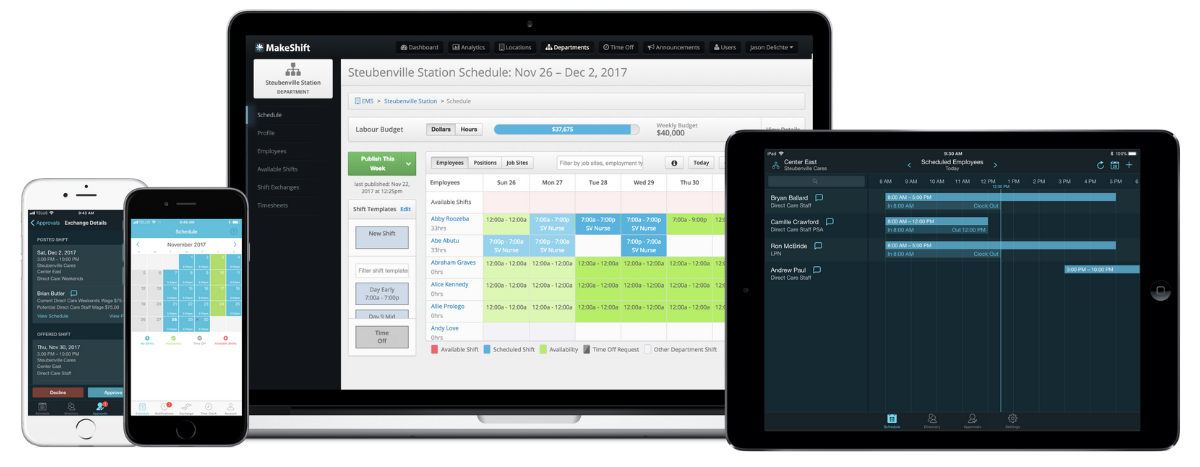Look, you already know your nurses can make or break your facility’s level of patient care and how your patients FEEL about their care.
Is your nursing staff highly skilled in providing exceptional care with kindness and compassion?
If so, congratulations — your patients will spread the news.
On the other hand, if you struggle to retain stellar nurses like the ones above, that’ll damage patient perception.
And unfortunately for you, they’ll spread that news too.
Even with today’s nursing shortage, you can improve your nurse hiring by focusing on how you recruit new nurses.
Think of improving your nurse recruitment strategy as the secret sauce for finding AND keeping your best nurses.
You’ll also build a name for yourself in the healthcare community, making your facility the place nurses want to be.
But before you start making job postings: It’s time to create a stable, thriving team that delivers excellent patient care while making your workplace great.
- Why Improve Your Nurse Recruitment Strategy?
- 11 Challenges Affecting Nurse Recruitment
- 12 Strategies to Recruit More Nurses By Improving Your Employee Experience
- MakeShift Can Up Your Nurse Recruitment Game
- Nurse Recruitment Strategy FAQs
Why Improve Your Nurse Recruitment Strategy?
A people-centric recruitment approach helps you find first-rate nursing candidates who mesh with your facility’s operation.
And when done right, those highly-skilled nurses tend to stick around.
Remember, the recruitment stage is a nurse’s first glance into how your operation is run. So, when your recruitment process shows that you put nurses first, that’ll make your facility stand out.
A side note here: Most nurses love their work.
They became nurses because they wanted to help people. But, especially after Covid, they’re not willing to sacrifice their work-life balance or mental and physical health to stay in the profession.
Today’s nurses look for a workplace where they feel valued, challenged, cared for, and appreciated.
If your recruitment strategy doesn’t convey that, you’ll have a heck of a time getting quality nurses on your staff.
Before you work on upgrading your nurse recruitment strategy, it’s important to be aware of some of the challenges you’re facing.
11 Challenges Affecting Nurse Recruitment
Several factors contribute to the enormous gap between supply and demand for nurses today. Here’s our highlight list of the top 11 challenges.
1. Nursing Shortage
Recruiting nurses is tough when there aren’t enough to go around. There’s a growing shortage of qualified nurses in regions of developed and developing countries, leading to intense competition for a limited pool of candidates.
Over 1/5 of all nurses plan to retire within the next 5 years.
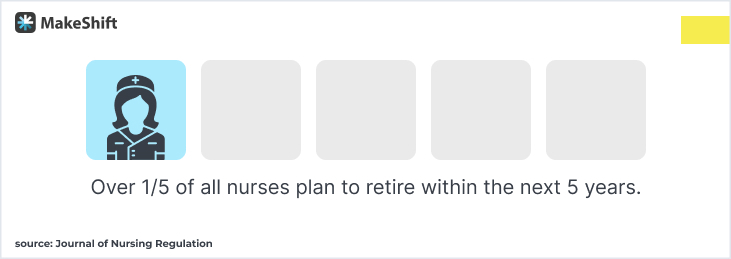
2. Aging Population
Many experienced nurses are close to retirement age, creating a gap in the workforce that needs to be filled by recruiting and training new nurses.
The average age of RNs in the U.S. is 52 and 43 in Canada.
3. PTSD after Covid
Recruiting new nurses has encountered an unexpected challenge due to the lasting impact of Covid.
Many seasoned nurses are contending with PTSD stemming from their demanding experiences during the pandemic. This emotional burden has impacted attracting fresh nursing talent to healthcare facilities.
The visible struggles of today’s nurses who endured Covid can understandably make prospective recruits apprehensive about entering the field.
4. High Demand
The demand for healthcare services is rising due to an aging population and increasing healthcare needs, which adds to the pressure of finding and retaining skilled nurses.
The number of RN jobs will grow by 6% from 2021 to 2030.

5. Workload and Burnout
The nursing field is physically and emotionally demanding, leading to burnout and high turnover rates.
This makes it tough to retain skilled nurses and can discourage potential candidates from entering the field.
6. Lack of Faculty and Education Programs
A nursing faculty shortage in educational institutions limits how many nursing students can be trained.
The AACN reports that U.S. nursing schools limited enrollment in the 2021-2022 school year, turning away nearly 92,000 qualified applicants to maintain favorable student-to-teacher ratios.
7. Continuing Education
Recruiting nurses today faces another education-related hurdle. Some nurses aspire to jump directly into advanced roles, like Nurse Practitioners, affecting recruitment.
These ambitious nurses are choosing to pursue graduate studies right away.
However, this means fewer nurses are available for immediate patient care roles, making finding and hiring nurses more difficult than before.
8. Workplace Culture and Support
A positive workplace culture, supportive leadership, and opportunities for career growth are vital factors affecting nurse recruitment and retention.
You’ll struggle to attract and keep good nurses if your facility lacks these.
9. Geographical Imbalances
The geographical distribution of nurses is often uneven — rural areas are experiencing more significant shortages.
Recruiting nurses to these areas can be particularly challenging.
10. Brand Perception
How people see your healthcare facility matters, especially when getting new nurses on board.
If your facility has a positive reputation as a great place to work and learn, it excites nurses to join you.
On the flip side, if your brand is associated with a chaotic workplace that doesn’t value its nurses, it’ll be an uphill battle to convince nurses to work for you.
11. Chaotic Scheduling
Healthcare is known for chaotic scheduling. Nurses, particularly, struggle with work-life balance and not having control over their work schedules. Clunky, manual scheduling adds fuel to the fire in this area.
Facilities that offer flexible scheduling will beat out those that don’t every time.
12 Strategies to Recruit More Nurses By Improving Your Employee Experience
Nurses are done killing themselves for their jobs. They expect more from their work environment.
In other words, upping your employee experience will dramatically improve your nurse recruitment game.
Start by focusing on implementing a few of these strategies at a time.
1. Enhance Working Conditions
Create a supportive and inclusive work culture that values and respects your nurses' contributions. Start with these 3 ideas to improve your work environment:
- Double-check that shifts have a healthy balance of seasoned nurses and newer nurses. This ensures the quality of patient care isn’t compromised while also providing newer nurses the support they need for positive precepting experiences.
- Provide adequate resources and tech to streamline workflows and reduce stress.
- Offer healthy snacks & drinks they can grab on the go.
2. Focus on Work-Life Balance & Well-Being
This is a big one. Covid changed people’s perspective on life — nurses’ work-life balance and well-being are more of a non-negotiable issue than before.
Personal and professional well-being is associated with individuals’ job satisfaction, including:
- Ability to find meaning & fulfillment in work
- Feeling engaged
- Having a high-quality work experience
Implement some of these ideas to let your nurses know their well-being is a priority.
- Offer flexible scheduling options, like part-time and job-sharing.
- Implement self-scheduling systems that allow nurses to choose shifts that align with their lives.
- Post schedules at least 1 month in advance.
- Provide access to employee assistance programs (EAPs) that offer counseling and support for mental health challenges.
- Encourage taking time off to recharge & refresh
- Establish wellness initiatives, such as: stress reduction workshops, yoga classes, mindfulness programs.
3. Improve Your Staff Scheduling System
Give your nurses more say in their shifts. Use nurse scheduling software to streamline the process and offer an interactive approach to scheduling.
Staff scheduling software makes it quick and easy for nurses to swap shifts or find coverage when life happens last minute, and they need to change their schedule.
Plus, they can do this right on their phones.
Encourage nurses to set their availability so you can create accurate schedules that mesh well with their lives.
4. Professional Development
Medical knowledge and technologies change rapidly. Because nurses are often the primary point of contact for their patients, continuing education can be a significant factor in the quality of patient care.
Offer clear career advancement pathways, allowing nurses to grow within the organization.
Provide funding for continuing education and certifications to encourage skill development and specialization.
Nurses with access to professional development programs have
- Higher job satisfaction
- Better productivity
- Greater resistance to burnout
5. Competitive Compensation and Benefits
We all know that part of an exceptional employee experience comes through money and benefits. Ensure your nurses receive competitive salaries that reflect their skills and dedication.
Offer comprehensive benefits packages that include:
- Health insurance
- Retirement plans
- Paid time off
- Tuition reimbursement
- Loan payoff program
Add modernized benefits like wellness packages that reimburse for things like gym memberships and massage therapy to demonstrate that a nurse's wellness is valued.
6. Create nurse ambassadors
Make your top nurses your brand ambassadors. It’s those nurses who make up the culture of your organization.
Ask them to share quick posts and videos on your social media platforms to show candidates a typical workday. Include their testimonials in your marketing content (website, blog, videos… etc.) to create an emotional connection with potential nursing hires.
Then, go a step further by offering bonuses to your nurses who recruit other skilled nurses.
7. Mentorship and support
Experienced nurses in demanding hospital specialties are getting hard to come by and even harder to keep.
To bring in brand new nurses without suffering from lack of experience, implement strong mentoring programs.
- Establish mentorship programs pairing experienced nurses with new nurses for guidance and support.
- Offer peer support groups where nurses can share experiences and challenges and brainstorm solutions.
- Provide applicants with resources like a resume template to assist them in presenting their qualifications effectively, streamlining the hiring process for both parties.
8. Make your brand personable and relatable
You can be personal and professional at the same time. Personalize your communications strategy instead of sending generic messages to a pool of nursing candidates.
Humanize your organization by emphasizing why seasoned nurses would want to be part of your organization with:
- Personalized performance management
- Intentional culture building
- Authentic communication
76% of job seekers are more likely to apply for a position with an organization that proactively manages its brand. By doing this, you can reduce turnover by up to 28%.
9. Less Administrative Burden
Show potential nurse employees that they’ll spend significantly less time on administrative tasks.
Implement tech to streamline documentation and administrative tasks, giving nurses more time for patient care.
Choose user-friendly electronic health records (EHR) systems to minimize frustrations and enhance efficiency.
10. Culture of Collaboration
Foster a collaborative environment where nurses and other healthcare professionals work together as a team.
Institute shared governance programs so nurses are given a voice by being part of decision-making processes that impact their workflows.
Encourage open communication and idea-sharing across all levels of your organization.
11. Address Discrimination and Bias
Implement diversity and inclusion initiatives to create a welcoming environment for nurses from diverse backgrounds.
Provide training to address unconscious biases and ensure equitable treatment for all nurses.
12. Employee Feedback Channels
Let your potential new hires know their voice matters.
Establish regular feedback methods to allow nurses to voice concerns, suggestions, and ideas for improvement. Here are a couple of ideas for gathering feedback…
- Host a monthly check-in session for your nursing staff.
- Email a monthly survey (you can create one in Google Forms).
Act on the feedback to demonstrate a commitment to nurses' well-being and satisfaction.
How MakeShift Can Help You Recruit Nurses
Most healthcare environments are fast-paced and quickly changing and face the challenge of operating 24/7. Many nurses are scheduled on rotations, and shift callouts are heavily used to bring in more staff in times of need.
MakeShift is a high-tech solution to manage these hectic schedules and make scheduling easier, more transparent, and nurse-friendly.
Key Features that cater to nurse scheduling
- Available Shifts — Whether it's an emergency or you're just short-staffed, broadcasting an available shift that your nurses can pick up can be a lifesaver. (To both you & them.)
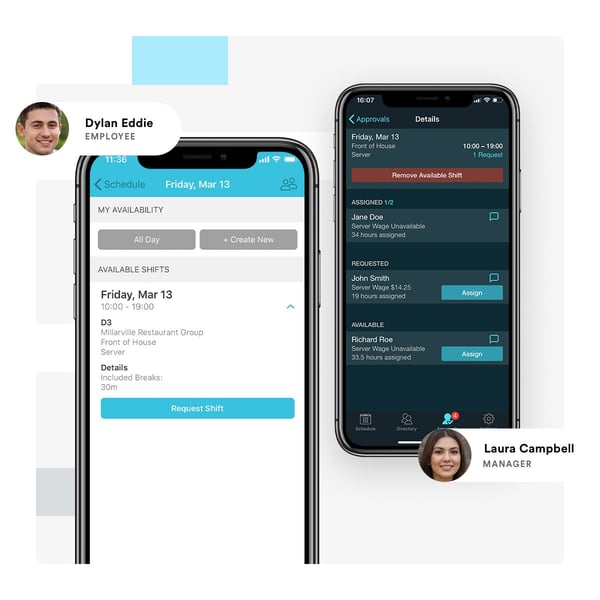
- Rotation-Based Scheduling — Build out your rotation templates and schedule your nursing staff on any length of rotation.
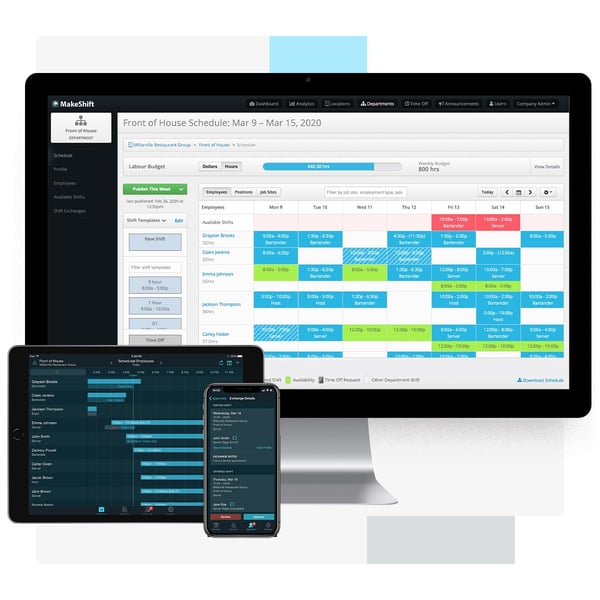
- Skills-Based Scheduling — Ensure you have the most highly skilled nurses in the right place at the right time.
- Shift Swapping — Allow staff to exchange shifts with one another, reducing the need to constantly update schedules manually.
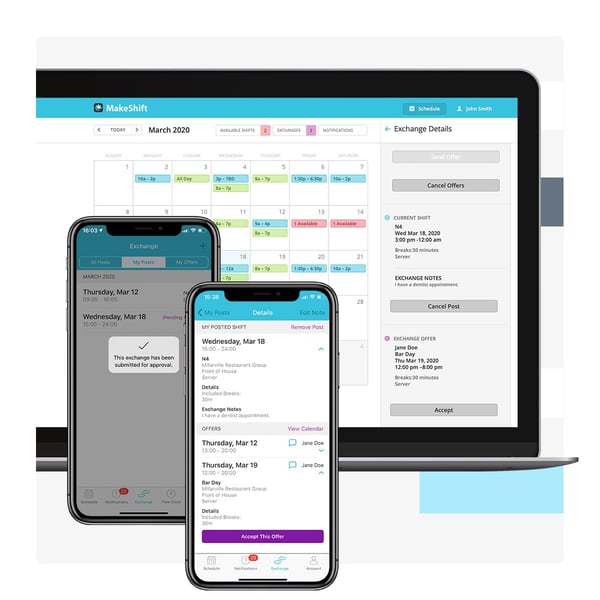
- Time Off / Leave Management — Quickly approve or decline employee time off requests to ensure you aren't scheduling staff when they’re unavailable.
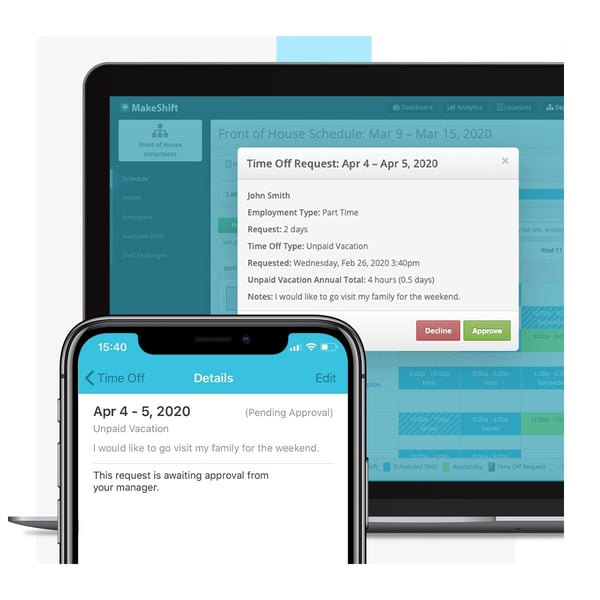
Nurse Recruitment Strategy FAQs
How do you attract a nurse?
To attract nurses, offer competitive salaries, flexible schedules, career growth opportunities, and a positive work environment.
Highlight your organization's commitment to patient care and staff well-being.
Is recruiting nurses hard?
Yes, recruiting nurses can be challenging due to high demand and competition. Offering attractive benefits and addressing work-life balance concerns can help overcome these challenges.
How do I become a successful nurse recruiter?
To be a successful nurse recruiter, build relationships with nursing schools, attend job fairs, use online job platforms, and understand nurses' needs and preferences.
Communicate effectively and showcase your organization's strengths.
How do you attract nurses to rural areas?
Attract nurses to rural areas by offering incentives like student loan forgiveness, housing assistance, higher pay and emphasizing the unique benefits of rural practice, such as close-knit communities and work-life balance.
What do nurses want most?
Nurses value competitive salaries, job security, supportive management, work-life balance, professional development opportunities, and a positive team environment.
How do you recruit and retain nursing staff?
Recruit and retain nursing staff by creating a supportive work culture, offering career advancement pathways, providing educational opportunities, recognizing achievements, and addressing burnout.
How do you recruit and retain healthcare professionals?
Recruit and retain healthcare professionals by offering competitive compensation, opportunities for professional growth, a healthy work-life balance, mentorship programs, and recognition of their contributions to patient care.
Is your Nurse Recruitment Strategy Ready for an Upgrade?
Now, you’ve got the keys to unlocking an upper level of nurse recruitment success.
By addressing the challenges head-on and prioritizing the nurse experience, you're not just filling positions — you're building a powerhouse healthcare team.
Remember, a skilled and satisfied nursing team isn't just good for your facility. It's a game-changer for patient care.
Jump into implementing these strategies, show nurses you've got their back, and watch your recruitment efforts shine brighter than ever.
Want to know how MakeShift can enhance your employee experience? Schedule a demo with us today. We’ll be happy to show you how our scheduling software can put your nurses first.




